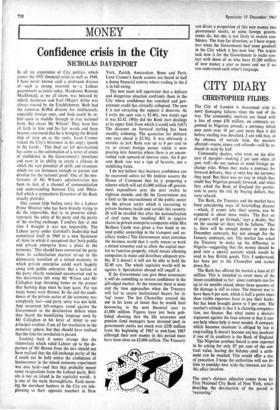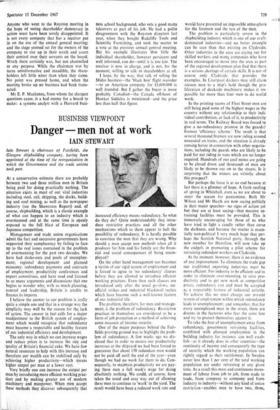CITY DIARY
CHRISTOPHER FILDES
The City of London is threatened with its most damaging failures since the end of the war. The commodity markets are faced with a loss of some £30 million, on contracts ex- pressed in Nigerian pounds, a currency which now costs over 16 per cent more than it did before sterling was devalued. I am told that, in the absence of outside help, the markets affected—cocoa, copra and oilseeds—will be re- duced in scale by half.
Commodity dealers, who work on the thin- nest of margins—making per cent when all goes well—do not reckon to stand foreign ex- change risks. When they make a contract for forward delivery, they at once buy the currency they need. But there was no way in which they could buy Nigerian pounds forward, and when they asked the Bank of England for permis- sion to cover the risk by buying dollars, they were refused.
The Bank, the Treasury and the market have been considering ways of forestalling disaster —which, if events take their course, can be expected in about three weeks. 'The first set of papers will go through,' says a dealer, 'but on the second set there will be failures.' That is, there will be enough money to meet the December contracts, but not enough for the January contracts, too. The market has asked the Treasury to make up the difference to Nigeria—suggesting that the money should be paid into a special account which would be used to buy British goods. This, I understand, has been put to the Chancellor and turned down flat.
The Bank has offered the market a loan of £5 million. This is intended to cover most of the losses established so far: since contracts run for up to six months ahead, about three quarters of the damage is still to come. The interest was to have been 6 per cent, which is half a point more than visible exporters have to pay their banks, but has been brought down to 5 per cent. The market's attitude is that it is claiming compensa- tion, not finance. But what seems a decisive argument against the loan scheme is that it can- not help where help is most needed. A company which becomes insolvent is obliged by law to stop trading. It doesn't become any less insolvent if one of its creditors is the Bank of England.
The Nigerian produce board is now reported to be asking for only 87 per cent of the con- tract value, leaving the balance until a settle- ment can be reached. This would offer a stay of execution. I hope the authorities will use the time to consider how wide the interests are that this affair involves.
The year's choicest adjective comes from the First National City Bank of New York, which describes the devaluation of the pound as `reassuring.' Anyone who went to the Royston meeting in the hope of seeing shareholder democracy in action must have been sorely disappointed. It is not every company that has a receiver put in on the eve of the annual general meeting; and the stage seemed set for the owners of the company to rise up in their wrath and assert their control over their servants on the board. Wrath there certainly was, but not channelled to any purpose. While the chairman 'was by turns uninformative and inaudible, the share- holders left little wiser than when they came. No point was pressed home, and when the meeting broke up no business had been trans- acted. '
Mr E. P. Mackenna, from whom the sharpest questions came, is a bad enemy for a board to make: a systems analyst with a Harvard busi- ness school background, who vets a good many takeovers as part of his job. He had a polite disagreement with the Royston directors last year, when they bought Radcliffe Tools and Scientific Furnishing, and took the matter to a vote at the previous annual general meeting. But his example illustrates hbw little the individual shareholder, however persistent and well informed, can do—until it is too late. The receiver is now in charge, and is not, for the moment, willing to talk to shareholders at all.
I hope, by the way, that talk of selling the Midas business—the 'black box' flight recorder —to an American company for £1,600,000 is well founded. But I gather the buyer is more probably Canadian—the Canada offshoot of Hawker Siddeley is mentioned—and the price less than half that figure.



































 Previous page
Previous page